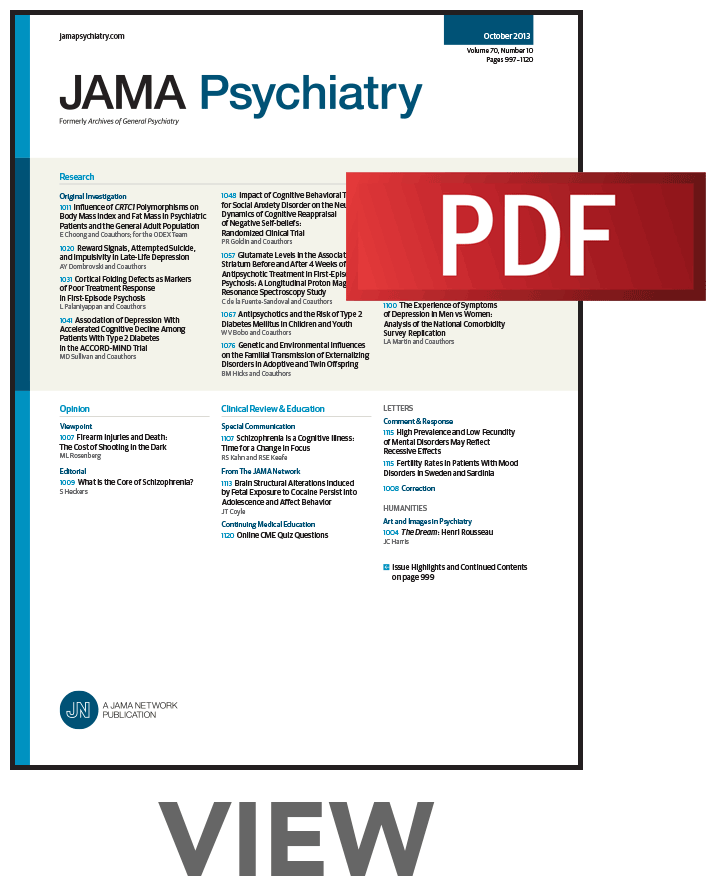降低世界卫生组织风险饮酒水平作为酒精临床试验的主要疗效终点:综述
IF 17.1
1区 医学
Q1 PSYCHIATRY
引用次数: 0
摘要
酒精使用障碍(AUD)是一种非常普遍和昂贵的精神疾病。禁欲被认为是治疗AUD的最佳结果。然而,大多数AUD患者不寻求治疗,因为他们没有禁欲的目标。美国食品和药物管理局(FDA)最近将减少饮酒量作为酒精药物治疗试验的主要终点,定义为世界卫生组织风险饮酒水平(WHO rdl)至少降低2级。批准减少饮酒量作为酒精临床试验的终点,与酒精领域关于减少饮酒量的文献积累一致。本文对34篇文章进行了叙述性回顾,这些文章将世卫组织rdl作为AUD患者感觉和功能的替代标记进行了研究。来自流行病学研究、社区样本和临床试验的结果表明,减少饮酒与患者感觉和功能的改善有关,包括减少物质使用障碍、医疗和精神疾病的风险,以及减少与酒精相关的后果、渴望和医疗保健费用。减少饮酒也与功能和生活质量的改善有关。大多数临床试验参与者也实现了饮酒量的减少,并且活性药物与安慰剂的WHO RDL减少的效应量与替代终点相似或更好。结论和相关性FDA接受WHO rdl的减少作为酒精临床试验的主要终点,可能会增加AUD药物开发的机会,鼓励患者寻求以减少饮酒为目标的治疗方法,并让临床医生参与处方有效支持减少饮酒的药物。在临床实践中,世卫组织的rdd可能对有针对性地减少饮酒特别有用。世卫组织RDL终点的确定促进了AUD治疗向减少危害方法的范式转变。本文章由计算机程序翻译,如有差异,请以英文原文为准。
Reductions in World Health Organization Risk Drinking Levels as a Primary Efficacy End Point for Alcohol Clinical Trials: A Review.
Importance
Alcohol use disorder (AUD) is a highly prevalent and costly psychiatric disorder. Abstinence has been considered the optimal outcome of treatment for AUD. Yet, most individuals with AUD do not seek treatment because they do not have a goal of abstinence. The Food and Drug Administration (FDA) has recently qualified reductions in drinking, defined by at least a 2-level reduction in the World Health Organization risk drinking levels (WHO RDLs), as a primary end point for alcohol pharmacotherapy trials. The approval of drinking reductions as an end point for alcohol clinical trials aligns with an accumulating literature on drinking reductions in the alcohol field. This article provides a narrative review of 34 articles that have examined WHO RDLs as a surrogate marker of how people with AUD feel and function.
Observations
Results from epidemiological studies, community samples, and clinical trials indicate that drinking reductions are associated with improvements in how patients feel and function, including reduced risk of substance use disorder and medical and psychiatric diseases and reductions in alcohol-related consequences, craving, and health care costs. Drinking reductions are also associated with improvements in functioning and quality of life. Drinking reductions are also achieved by most clinical trial participants, and effect sizes for the WHO RDL reductions for active medications vs placebo are similar to or better than alternative end points.
Conclusions and Relevance
The FDA acceptance of reduction in WHO RDLs as a primary end point for alcohol clinical trials may increase opportunities for AUD medications development, encourage patients to seek treatments that target drinking reductions, and engage clinicians in prescribing medications shown to be effective in supporting drinking reductions. The WHO RDLs may be particularly useful for targeted drinking reductions in clinical practice. Qualification of the WHO RDL end point facilitates a paradigm shift toward a harm reduction approach in AUD treatment.
求助全文
通过发布文献求助,成功后即可免费获取论文全文。
去求助
来源期刊

JAMA Psychiatry
PSYCHIATRY-
CiteScore
30.60
自引率
1.90%
发文量
233
期刊介绍:
JAMA Psychiatry is a global, peer-reviewed journal catering to clinicians, scholars, and research scientists in psychiatry, mental health, behavioral science, and related fields. The Archives of Neurology & Psychiatry originated in 1919, splitting into two journals in 1959: Archives of Neurology and Archives of General Psychiatry. In 2013, these evolved into JAMA Neurology and JAMA Psychiatry, respectively. JAMA Psychiatry is affiliated with the JAMA Network, a group of peer-reviewed medical and specialty publications.
 求助内容:
求助内容: 应助结果提醒方式:
应助结果提醒方式:


